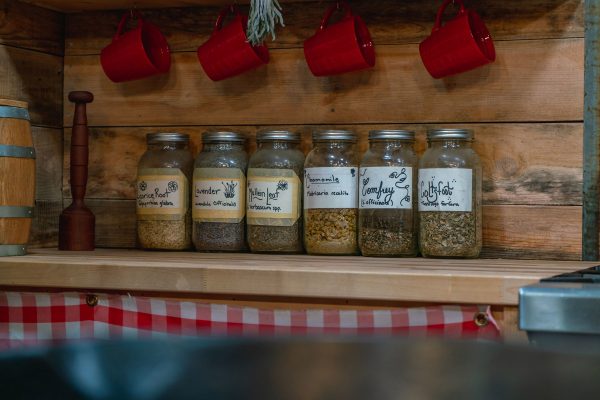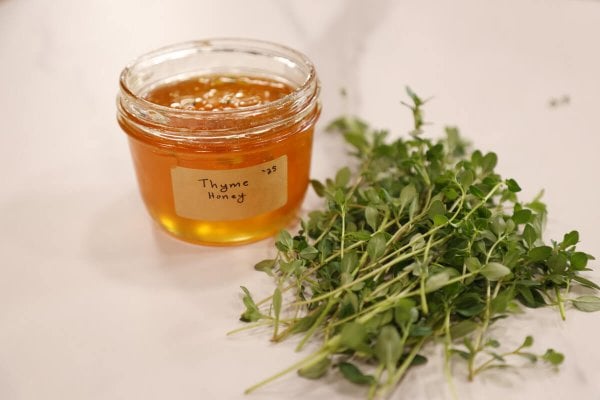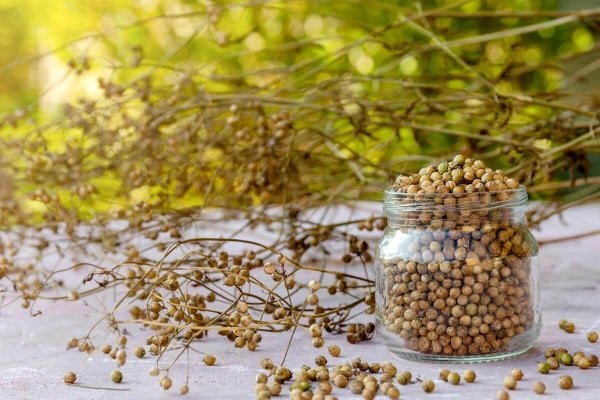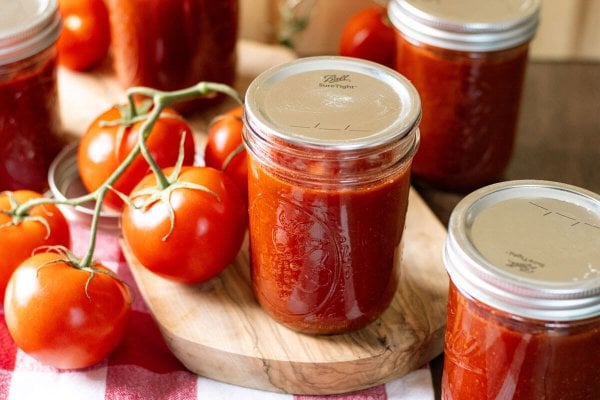Did you know that Epsom salt, that humble white compound you may have tucked away in your bathroom cabinet, has a whole range of valuable uses? From cleaning your kitchen and bathroom to enhancing your laundry; Epsom salt is a multipurpose powerhouse that can revolutionize the way you approach household chores.

Table of Contents
ToggleWhy I Love These Epsom Salt Uses
Not only do I love a good Epsom salt bath for soaking, detoxing and relaxing, but I also love how many uses there are for this natural substance around the house.
If I can clean my home with natural substances that allow my children to jump in and help, that’s a win-win in my book. Especially when there are multiple uses for one item, which cuts down on how many products I need to purchase.
If you’ve been around here for a while, you know I love homemade cleaning supplies like my all-purpose cleaning powder, this homemade glass cleaner, homemade all-purpose spray, homemade cleaning paste, homemade disinfectant spray, and even these laundry strategies to keep up with my large family of eleven children. I also love these other natural products with multiple uses around the home:
- Surprising Uses of Salt in Everyday Life
- Vinegar Uses: Discover Surprising Household Hacks
- Washing Soda Uses: My Top Tips for Clean Living
- Versatile Cornstarch Uses for Home & Kitchen
- Unexpected Dish Soap Uses – Tips & Tricks!
- Hydrogen Peroxide Uses: Clever Cleaning Tips
- Versatile Cream of Tartar Uses in Your Home

What Is Epsom Salt
Epsom salt, scientifically known as magnesium sulfate, is a naturally occurring mineral compound. It is not the same as the salt you use to season food, but is composed of magnesium, sulfur, and oxygen. Epsom salt is named after the town of Epsom in England, where it was first discovered in a saline spring.
Epsom salt has a long history of use for various purposes. Its unique chemical composition gives it a range of beneficial properties that make it a valuable addition to any home.

Epsom Salt Precautions
There are plenty of claims on the internet that Epsom salts can be used for health remedies such as constipation relief, curing magnesium deficiencies, and detoxifying bath soaks, but many are anecdotal and need more research to prove their effectiveness.
While Epsom salt is generally safe for most people, there are risks of unpleasant side effects, including minor skin irritations, gastrointestinal distress, and reactions when combined with other supplements and medications. For this reason, you should not use Epsom salts in your healthcare routine unless directed by your healthcare professional.
Epsom salts have also been touted by home gardeners as a miracle cure for pest control, preventing blossom end rot, general fertilization, and more. Epsom salts have not been proven to kill insects, slugs, or grubs; it can actually promote blossom end rot and can create nutrient imbalances in your garden.
When using Epsom salts for household purposes, it’s important to note that the combination of the compounds in Epsom salts and soap creates soap scum. Mixing the two will work against your cleaning efforts as opposed to enhancing them.
| Epsom Salt Claim | Other Methods to Try |
|---|---|
| General Soil Fertilizer | Epsom salts are only beneficial if your soil is magnesium deficient. A magnesium deficiency is unlikely if you are regularly amending your soil with homemade compost. The best gardening practice is to always test your soil to confirm a magnesium deficiency before amending it with Epsom salts. |
| Skin Exfoliator | This DIY rose and honey face wash uses the medicinal benefits of roses and raw honey to gently exfoliate the skin to reveal a more youthful appearance. This simple homemade sugar scrub works well to keep hands soft and moisturized. |
| Sunburn Relief | Studies have shown that when used topically, chamomile can soothe minor skin irritations, including sunburns. (Source) Using dried chamomile (or freshly harvested chamomile from your herb garden), brew a strong cup of tea. Soak a cloth with the tea and apply it to the sunburn for soothing relief. |
| Insect Bites | Mix a tablespoon of baking soda with enough water to make a paste, and apply to insect bites and stings for 10 minutes before rinsing away. Homesteading Hack: Learn more surprising uses for baking soda here! |
| Sore Muscles | Arnica has powerful pain-relieving properties (Source), and this homemade arnica salve is our go-to remedy for tired and sore muscles. |
| Splinter Removal | Vinegar provides antimicrobial benefits to protect your wound from becoming infected. (Source) Soak the splinter in apple cider vinegar (or try this apple scrap vinegar) for 30 minutes to draw out the splinter. Remove the splinter with clean tweezers, and use this homemade antibiotic ointment for further protection. Homesteading Hack: Learn more household uses for vinegar here! |
| Stress Relief | Tulsi (Holy Basil) is an adaptogenic herb, meaning it supports the body’s ability to adapt to stress. It brings a sense of calm to one’s mental and emotional well-being. (Source) Tulsi can be prepared as an herbal tincture, tea, or as an encapsulated supplement. Homesteading Hack: Learn how to grow tulsi to stock your herbal medicine cabinet. |

Household Uses for Epsom Salt
With its natural cleansing properties, Epsom salt can tackle tough stains and grime in the kitchen, bathroom and laundry room.
| Task | Method |
|---|---|
| All Purpose Cleaning | Mix equal parts of Epsom salt and liquid dish soap (do not use true soaps made from natural fats) to create a powerful DIY cleaner. Use this solution to wipe down countertops, appliances, and even cutting boards. The abrasive nature of Epsom salt helps to remove stuck-on residue, while the dish soap cuts through grease and leaves a streak-free shine. |
| Clean Dirty Pots and Pans | Simply sprinkle some Epsom salt onto the stubborn stains and add a little warm water. Let it sit for a few minutes to loosen the grime, then scrub away with a sponge or brush. The abrasive nature of Epsom salt helps to remove grease and food residue, making your cookware shine again. |
| Tile Cleaner | Epsom salt is an effective cleaner for kitchen and bathroom tiles, helping to remove grime and stains. Mix equal parts Epsom salt and liquid dish soap (do not use true soaps made from natural fats) to create a paste. Apply the paste to the tiles, scrub gently with a brush, and rinse thoroughly for sparkling, clean tiles. |
| Grout Cleaner | Tile grout in the kitchen and bathroom can accumulate dirt and grime over time, especially in high-traffic areas. Create a paste by mixing Epsom salt with water and apply it to the stained areas. Let it sit for a while, then scrub gently with a brush. The grime will be lifted, revealing clean and fresh grout. |
| Washing Machine Cleaner | Over time, residue and buildup can affect the performance of your washing machine and its ability to clean your clothes. But fear not, Epsom salt can come to the rescue. Simply add a cup of Epsom salt to an empty washing machine and run a hot water cycle. This will help remove any dirt, grime, and detergent buildup, leaving your machine fresh and ready for the next load. |
| Laundry Detergent Booster | Add a cup of Epsom salt to your regular laundry detergent before starting the wash cycle. The magnesium sulfate in Epsom salt enhances the cleaning process by removing dirt, grime, and lingering odors, ensuring your clothes come out cleaner and fresher. Note: This hack only works with true laundry detergents. If you make your own laundry soap, the Epsom salt will react with the soap causing a soap scum mess on your clothes and washing machine. |
By leveraging the benefits of Epsom salt, you can go beyond the expected uses and enhance various aspects of maintaining a well-kept home. From general household cleaning to specific tasks like keeping your washing machine maintained, Epsom salt offers versatile solutions that are both effective and environmentally friendly.

FAQ
Epsom salt, scientifically known as magnesium sulfate, is a naturally occurring mineral compound composed of magnesium, sulfur, and oxygen.
While Epsom salt is generally safe for most people, it is important to consult with a healthcare professional if you choose to use Epsom salt in your healthcare or personal care routine.
Epsom salt can help clean dirty pots and pans, remove stubborn grime from tiles and grout, act as a natural cleaner for various surfaces, clean the washing machine, remove stubborn mud stains, and act as a potent detergent boost for cleaner and fresher clothes.
Epsom salt is commonly used for taking relaxing baths and indulging in foot soaks to soothe muscles, alleviate body aches, and provide stress relief, but these methods need further research to prove their efficacy.

Other Posts You May Enjoy
- Herbal Cleansing Detox: What You Need to Know
- Versatile Uses for Borax Around Your Home
- Vinegar Uses: Discover Surprising Household Hacks
- Baking Soda Uses: Cleaning Tips & Household Hacks
- Washing Soda Uses: My Top Tips for Clean Living
- Hydrogen Peroxide Uses: Clever Cleaning Tips
- Versatile Cream of Tartar Uses in Your Home


















